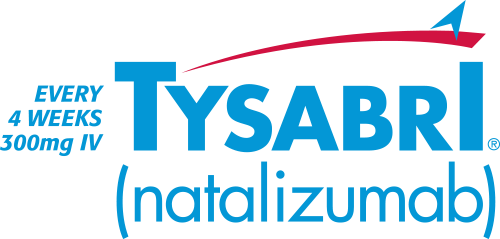FAQs about TYSABRI
Get answers to your questions about TYSABRI by selecting one of the topics below.
TYSABRI?
What kind of medication is TYSABRI?
TYSABRI is a disease-modifying therapy (DMT) that has been available to treat relapsing multiple sclerosis (MS) for over 15 years. DMTs may help:
- Slow the progression of new or growing lesions
- Reduce the number of relapses
- Delay disability progression
It’s important to note that DMTs do not treat symptoms. Instead, they aim to work at the root of relapsing MS disease activity. Learn more.
How is TYSABRI thought to work?
We don’t fully understand how TYSABRI works. But it’s thought to play a role in preventing rogue immune cells from entering your central nervous system (CNS) and mistakenly attacking your nerve cells.
By keeping B and T cells in your bloodstream and blocking them from entering your CNS, TYSABRI may help reduce damage to your nerve cells. Click here to learn more about how TYSABRI is thought to work.
What’s the difference between TYSABRI and a biosimilar?
TYSABRI is a biologic medicine which means it’s made from living things like cells and proteins. When compared with its proposed biosimilar medicine, a biologic medicine can also be known as the "reference" medicine.
A biosimilar medicine has a similar structure and function compared to its FDA-approved biologic medicine. The FDA will compare the biosimilar against the reference medicine to ensure there are no significant differences.
There are many factors to keep in mind when you and your healthcare provider are considering treatment options for your relapsing MS. Some topics you may want to bring up to your healthcare team include:
- How well your current treatment is working for you
- Your most recent MRIs and bloodwork
- Financial or patient support
What is the difference between a biosimilar and a generic medicine?
A biosimilar medicine is not the same as a generic medicine. A biosimilar is a biologic medicine that is highly similar to an already-approved biologic medicine. This differs from generics, which have the same active ingredient as their reference medicine.
Both biosimilar and generic medicines are compared to an original or reference product. Both medicines go through a thorough review process by the FDA to ensure there are no significant differences.
infusions
How is TYSABRI given?
TYSABRI is administered every 28 days as an infusion by a trained healthcare professional. The actual infusion takes an hour.
For your first 12 infusions, you'll be asked to stay for an additional hour for routine observation. After your 12th infusion, your healthcare provider may decide to shorten or skip the observation period.
What is the TOUCH® Prescribing Program?
The TOUCH Prescribing Program is a risk monitoring program for anyone receiving TYSABRI. TOUCH ensures that you communicate closely with your healthcare team to monitor progressive multifocal leukoencephalopathy (PML) risk over time, so you can decide whether TYSABRI remains right for you. Your doctor, nurse, pharmacy, and infusion center are all part of the TOUCH program.
Where can I find a TYSABRI infusion center near me?
You can receive TYSABRI only through the TOUCH Prescribing Program. An infusion location can be in a doctor’s office, hospital, or at its own facility.
Use our infusion site locator to find a treatment center near you.
How long can you stay on TYSABRI?
You may be treated with TYSABRI for as long as you and your healthcare team decide it is right for you. In the US, more than 50% of people being treated with TYSABRI have been using it for more than 5 years.*
*Of the 23,190 patients taking TYSABRI, 12,803 (55.2%) have been treated with TYSABRI for >5 years as of March 2025. TYSABRI was studied in a 2-year clinical trial, and your risk of developing PML can increase over time. Talk with your doctor to ensure the benefits continue to outweigh the risks.
effects
Does TYSABRI cause progressive multifocal leukoencephalopathy (PML)?
No, TYSABRI does not cause PML. However, taking TYSABRI can increase your risk of getting it. Many people have concerns about getting PML from taking TYSABRI, but it’s important to know that you can only get PML if you’ve been infected with the John Cunningham (JC) Virus. Your risk of getting PML is less than 1% regardless of JC Virus antibody status. Learn more about the JC Virus and PML.
Everyone’s risk of developing PML is different, so you should have a conversation with your healthcare team before starting TYSABRI.
Does TYSABRI have serious side effects?
TYSABRI can cause serious side effects, which include:
- Herpes infections
- Liver damage
- Allergic reactions
- Weakened immune system
- Low platelet counts
What are the most common side effects of TYSABRI?
The most common side effects are:
- Headache
- Feeling tired
- Urinary tract infection
- Joint pain
- Lung infection
- Depression
- Pain in your arms or legs
- Diarrhea
- Vaginitis
- Rash
- Nose and throat infections
- Nausea
- Stomach area pain
If you experience any side effect that bothers you or does not go away, tell your doctor.
on TYSABRI
What is Biogen Support Services and how can they help?
Biogen Support Services is here to help you throughout your time on TYSABRI. From the moment you start treatment, Biogen Support Services provides:
- One-on-one phone support from our Biogen Support Coordinators available 8:30 AM to 8:00 PM ET, Monday through Friday
- A variety of financial and insurance support services, including our Biogen Copay Program or Infusion Copay Assistance Program (if you’re eligible)
- Information about TYSABRI treatment and support services
- Support available in Spanish
To get started, call 1-800-456-2255 Monday-Friday from 8:30 AM to 8 PM ET. Remember, your healthcare team is always your best source of information.
